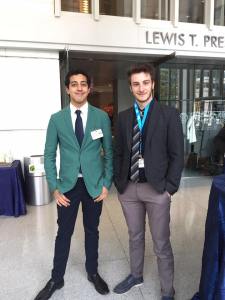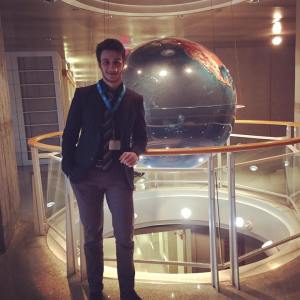By emreceyhun
The World Bank Group Youth Summit, which is established in 2013 in order to provide a platform for young entrepreneurs to promote their ideas on development, has organised a number of seminars ranging from climate change to education in crises zones. This year, I was able to attend to the Seminar on Education in Crisis Zones. With the vision of "rethinking education for the new millennium," and over 150 participants from 97 countries, the summit focused basically on gender education, new skills for the new economy and innovation in education.
It was a great opportunity for me to discuss these topics with similar-minded people and professionals from different NGO's as well as the World Bank. Since I have been volunteering with Syrian kids in Turkey for more than two years, I have ideas related to the solution for the problems we have encountered. I can say that the World Bank Group could provide me with a platform so that I can convey my thoughts. On the other hand, the NGO's and policy makers (For example, policy director at the White House, Office of the First Lady or Education Technical Advisor at USAID) discussed the future of education in the crisis zones with us.
The Youth Summit hosted a competition for social entrepreneur projects. Out of more than 100 projects, 6 projects founders selected by the World Bank Group as finalists, presented their projects, and the winner is determined by the joint votes given by the audiences and the specialists in the World Bank. The winner was a platform called "NaTakallam" that connects displaced Syrians with Arabic learners through Arabic sessions over Skype. This simple, but revolutionary project gives learners access to affordable, flexible, ans tailored training with native speakers, and provides an enriching work opportunity to displaced Syrians who, once resettled in a host country, struggle to join the workforce due to language barriers or strict labor policies. The winners will be sent to the seminar for entrepreneurs in Argentina hosted by International Council for Small Business. However, this year, there was also a bizarre situation because there was a tie between two projects. As a solution, one of the senior specialists in the World Bank offered to provide the seminars cost for the other winner. So, the other co-winner, project "ROYA," will be joining the seminar in Argentina. ROYA mentorship program is a comprehensive educational program in Afghanistan that enables children of impoverished families - girls in particular - to learn English and acquire computer literacy. From the winners, I deduced that the ideas to improve the societies should not be that complicated and costly. Instead, by focusing on one aspect of problem, one can create tremendous changes in the society.
In the Youth Summit, I improved myself by being informed the humanitarian crises all over the world, especially Africa, and widening my perspective towards social entrepreneurship and the common problems arising in every conflict: children and their educations are most effected and needs to puzzle my brain.


